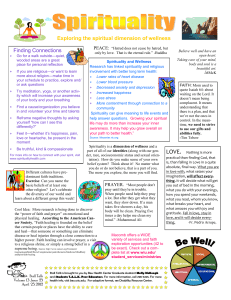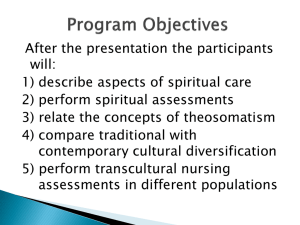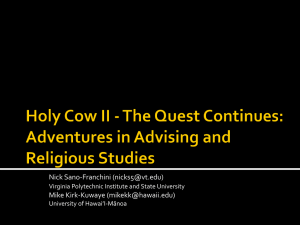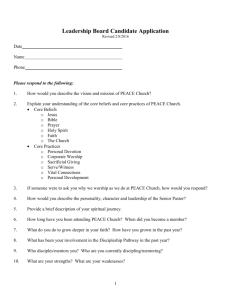Connectedness
advertisement
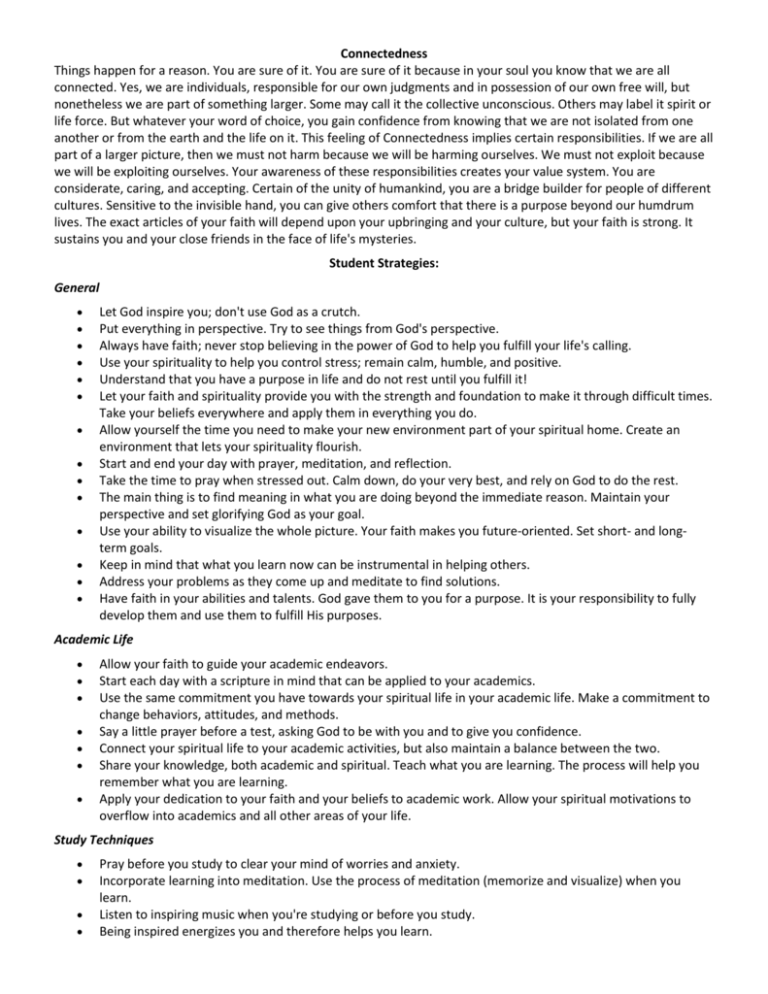
Connectedness Things happen for a reason. You are sure of it. You are sure of it because in your soul you know that we are all connected. Yes, we are individuals, responsible for our own judgments and in possession of our own free will, but nonetheless we are part of something larger. Some may call it the collective unconscious. Others may label it spirit or life force. But whatever your word of choice, you gain confidence from knowing that we are not isolated from one another or from the earth and the life on it. This feeling of Connectedness implies certain responsibilities. If we are all part of a larger picture, then we must not harm because we will be harming ourselves. We must not exploit because we will be exploiting ourselves. Your awareness of these responsibilities creates your value system. You are considerate, caring, and accepting. Certain of the unity of humankind, you are a bridge builder for people of different cultures. Sensitive to the invisible hand, you can give others comfort that there is a purpose beyond our humdrum lives. The exact articles of your faith will depend upon your upbringing and your culture, but your faith is strong. It sustains you and your close friends in the face of life's mysteries. Student Strategies: General Let God inspire you; don't use God as a crutch. Put everything in perspective. Try to see things from God's perspective. Always have faith; never stop believing in the power of God to help you fulfill your life's calling. Use your spirituality to help you control stress; remain calm, humble, and positive. Understand that you have a purpose in life and do not rest until you fulfill it! Let your faith and spirituality provide you with the strength and foundation to make it through difficult times. Take your beliefs everywhere and apply them in everything you do. Allow yourself the time you need to make your new environment part of your spiritual home. Create an environment that lets your spirituality flourish. Start and end your day with prayer, meditation, and reflection. Take the time to pray when stressed out. Calm down, do your very best, and rely on God to do the rest. The main thing is to find meaning in what you are doing beyond the immediate reason. Maintain your perspective and set glorifying God as your goal. Use your ability to visualize the whole picture. Your faith makes you future-oriented. Set short- and longterm goals. Keep in mind that what you learn now can be instrumental in helping others. Address your problems as they come up and meditate to find solutions. Have faith in your abilities and talents. God gave them to you for a purpose. It is your responsibility to fully develop them and use them to fulfill His purposes. Academic Life Allow your faith to guide your academic endeavors. Start each day with a scripture in mind that can be applied to your academics. Use the same commitment you have towards your spiritual life in your academic life. Make a commitment to change behaviors, attitudes, and methods. Say a little prayer before a test, asking God to be with you and to give you confidence. Connect your spiritual life to your academic activities, but also maintain a balance between the two. Share your knowledge, both academic and spiritual. Teach what you are learning. The process will help you remember what you are learning. Apply your dedication to your faith and your beliefs to academic work. Allow your spiritual motivations to overflow into academics and all other areas of your life. Study Techniques Pray before you study to clear your mind of worries and anxiety. Incorporate learning into meditation. Use the process of meditation (memorize and visualize) when you learn. Listen to inspiring music when you're studying or before you study. Being inspired energizes you and therefore helps you learn. Relationships Seek advice from others who share in your spirituality. Associate with people and groups that share the factors that define your identity. Many people won't understand your optimism or why you believe the way you do, but stay encouraged and direct your energy toward getting the job done. You do have a larger purpose! Class Selection If God has given you a dream, make movements towards it, study hard, take classes that are in line with that dream, and use opportunities to grow into your God-given dream. Instead of looking at disappointments as failures, analyze the situation and see what is to be learned from it. You can use those same skills of analysis of cause and effect in the academic setting. Take classes that encourage analysis. Choose classes that will help you grow in knowledge and are of particular interest to you, whether they confirm or challenge your beliefs. Co-curricular Activities Get involved in activities that cherish and value your beliefs. Find forums that allow you to voice your beliefs, and positions in which you can share your guiding insights and principles. Help others incorporate and reaffirm the role of academic success in their values system. Career Choose a job that corresponds with your spiritual priorities. In your job, use your values to earn trust and to build relationships with coworkers. Choose a career in which you can excel by helping others. Choose a career that will give you the time to meditate, as this is very important to you. Work must fit with your larger sense of mission, your "calling." Focus on these feelings and they will point you to an appropriate career. Your career does not necessarily need to be religious or spiritual in and of itself, but it does need to fit with what you feel "called to do" and what you believe is God's purpose for your life.
